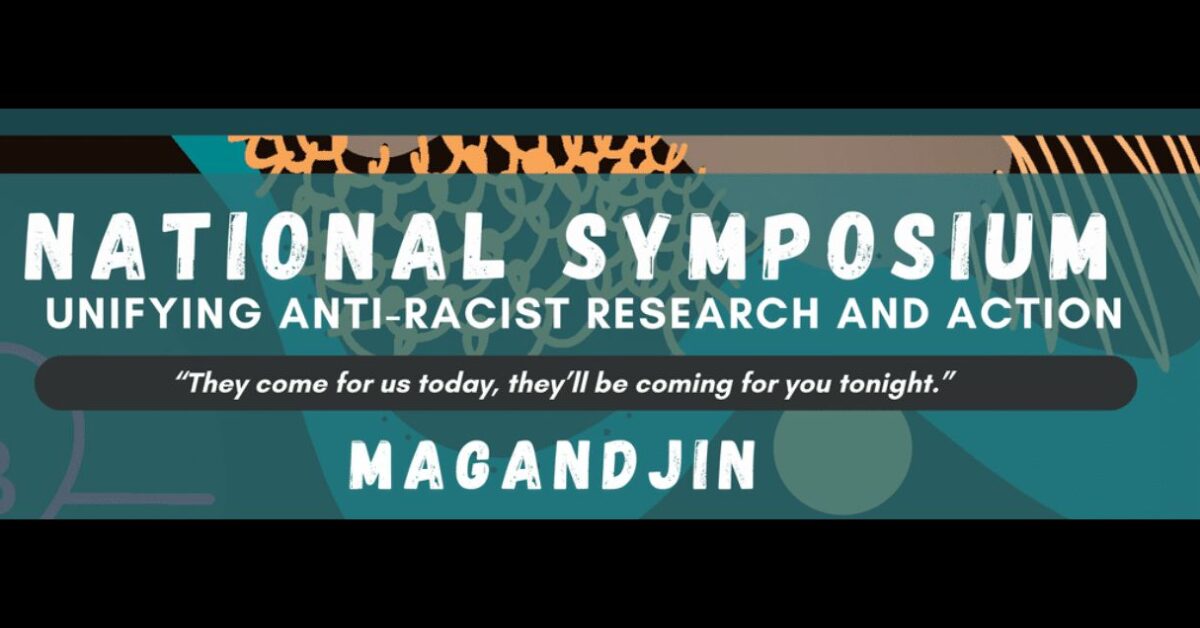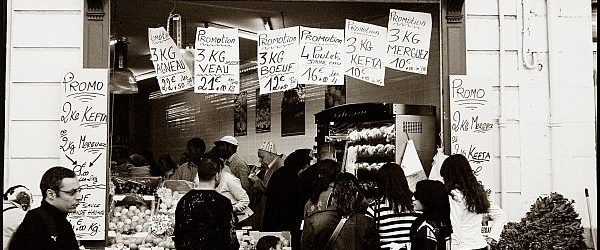Invasion Day has always been a time for settler violence and has always produced casualties. It has also always been a time of First Nations love, grief, rage and solidarity. On this day, the violent contradictions of “Australia” are spread out before us: a state built on a fundamental denial of Indigenous sovereignty and thus full humanity, a nationalism seeking to paper over this with hysterical emotion, and the inevitable reality that Aboriginal and Torres Strait Islander people are still here, as the protest slogan tells us.
In recent years, the Murdoch press has celebrated Invasion Day by whipping up media pile ons to try to “cancel” First Nations people and other racialised individuals who speak the truth about the violence at the heart of the Australian story. This year, the nationalist spectacle is on again, as the press work themselves into a frenzy about a university-based antiracist symposium led by Aboriginal scholars and built on long-standing networks of solidarity between First Nations and other racialised communities — particularly between First Nations, Palestinian and Jewish people.
This year’s QUT Symposium met in the staunch tradition of the Brisbane Blacks, who have fought for sovereignty, land rights, liberation and an end to racial violence for decades. It was a gathering of Elders, academics, organisers and frontline community workers who speak, theorise and embody the truth about race and racism in this place. It refused to clothe itself in multicultural platitudes about tolerance, or to speak about racism only in terms of individual prejudice. Instead, the symposium confronted the present state of racial politics with a rare clarity. It refused to shy away from the fact that we are living in a time of genocide against Palestinian people, livestreamed to the world and supported by Western states. A time of rapidly accelerating descent into open white supremacy, led by Trump in the United States and imitated by parliamentarians here. Everywhere, the dog whistles are being discarded for Nazi salutes on stage.
Of course, such an antiracist gathering will always be perceived as a threat. First Nations Professor Chelsea Watego, Jewish woman Sarah Schwartz and Palestinian academic Dr Randa Abdel-Fattah, as well as others including Sara Saleh, Lorna Munro and Matt Chun, are being attacked in various ways, including by being labelled as antisemitic.The attacks are ridiculous and widespread — even the conservative Spectator (in an article about the event with the sophisticated title “Shut it Down!“) says that the critics “are like firefighters blinded by smoke, spraying water in all directions.” As always, truth is absent in these media campaigns. In fact, they are most vicious against those who tell the deeper truth of the colony.
Schwartz, a human rights lawyer and Executive Officer of the Jewish Council of Australia, participated in a pre-symposium comedy debate, which sought to shine a spotlight on the farcical logics of racism. As conference leader Professor Watego stated at the beginning of this debate:
The purpose of this event is to lift and shift the nature of race conversations in this country — using humour as pedagogy. In doing so, we are not dismissing the life and death consequences of racial violence here and elsewhere. We take seriously the fight against racism, but we do not take seriously the absurd logics that are deployed to dismiss our right to undermine race as a structure of oppression … The greatest race debate — takes on the worst race takes in this country and calls it for what it is — a joke.
The comedy event was for those participating in the conference. As Professor Watego’s statement reveals, in satirising the violence of race, some of its power is undone, and a space is created where those who feel its blows can find joy together.
However, a single slide from Schwartz’s presentation focusing has been widely circulated, and has unleashed a firestorm of self-righteous condemnation of the symposium as antisemitic and racist. It didn’t matter that this slide was visually representing and critiquing Peter Dutton’s dangerous caricature of Jewish people in order to call out its violence. It didn’t matter that Schwartz’s presentation and critique of this caricature was based on an astute analysis of the way right-wing figures mobilise antisemitic tropes under the guise of defending Jewish safety. Israel Lobby groups, with the Murdoch press on speed dial, were already targeting the event and preparing their narratives. In the lead up to the symposium, they engaged in a coordinated campaign to have the event cancelled. When this didn’t work, one or more members of these groups attended with the explicit aim of recording and leaking anything they could find to feed the ritual Invasion Day media pile on.
The harm of these attacks was already becoming clear as the event proceeded. At the end of the conference, Professor Watego told the conference what was already clear — that someone was leaking information to the press with the intent of damaging individuals and misrepresenting the proceedings. At no point in time did she name or indicate who that person was. Though other Jewish academics in attendance recognized the leaker, he was never “outed” or named during the conference; few in the audience would have known who he was. He deliberately drew attention to himself by posting videos and speaking to the media after the conference. Yet this is now being reported as a coordinated public humiliation of a Jewish academic, which he has recounted in tearful and inaccurate detail. He does this apparently without irony or consideration for how his very actions have unleashed a violent storm against antiracist advocates that is causing real harm.
Contrary to the way the event has been portrayed by the Murdoch press, the symposium was a generative space for antiracist academics, activists, practitioners and community members. It was a space for shared reflection, mutual sustenance in the face of relentless racial violence, and an opportunity to learn from one another about how to stay in the struggle. At the heart of the event was a recognition that “while anti-Indigenous racism, Islamophobia, antisemitism and anti-Blackness operate in unique ways they are fundamentally interconnected.” As attendees and speakers, we left the symposium feeling reaffirmed in the struggle and better positioned to continue to cultivate solidarities within and between our communities — relationships we understand to be central to the fight against racism.
The attacks on Schwartz, Professor Watego and Dr Abdel-Fattah are gaining momentum, and the leaker now expresses concern about the personal nature of these attacks and their rapid escalation. Let us all be “open, honest and respectful“ he now cautions, after telling Jewish conference attendees in writing that he intentionally leaked footage and “co-supported the suppression” of the Jewish Council of Australia, which Schwartz leads. To call for respect and honesty at this stage and to suggest naivety about how this story would travel in the Murdoch Press is patently disingenuous.
Dutton is now condemning all universities as hotbeds of antisemitism and hatred, serving the long-standing right-wing agenda of undermining universities as independent spaces of dissent. It is hard not to see the humour in right wing politicians — until recently on the side of free speech against woke cancel culture — reinvent themselves as antiracists protecting vulnerable communities. But we know that this is not really about that; as Schwartz pointed out, Dutton’s supposed antiracism is being used as political cover to erase Palestinian voices, shut down Aboriginal and Torres Strait Islander peoples’ concerns and push racist policies.
And this is shown by the fact that all media coverage is erasing the fact that this was a conference primarily about racism experienced by First Nations people in this place. More than half the delegates were sovereign Aboriginal and Torres Strait Islander people, including Elders and those on the front lines of the fight against deaths in custody, mass incarceration and the casual racism that has been laid bare in the wake of the Voice Referendum. This symposium was an incredibly important and timely space to have nuanced and in-depth discussions about how to end racism within a political context where its proponents have been wildly emboldened by both the ALP’s lack of moral courage and the right’s racist dog-whistling.
Backlash against the symposium has reinforced the fact that Aboriginal and Torres Strait Islander people are never afforded the status of scholar or expert, particularly when it comes to racism. Coverage of the event paints it as unscholarly, with the Carumba Indigenous Research Institute labelled “a strange hybrid of problematic teaching, second rate research and extreme left wing activists.” LinkedIn commentators accuse Carumba head Professor Watego of “professionalising the art of racism under the guise of being an academic,” and University of Melbourne academic Professor Marcia Langton tells us that “any person whose judgment can be trusted would have known that it was likely there would be an incident causing outrage.” The casual erasure of Black intellectualism and scholarship is one of the most profound forms of racism — Black people can only be biased activists, or at best can only provide testimony on their wounds for appraisal by “objective” white experts. They certainly cannot situate themselves as part of an international anti-racist struggle in solidarity with other oppressed peoples.
All those who attended the symposium know the truth about Professor Watego’s work, Dr Abdel-Fattah’s academic rigour and integrity, and the symposium itself. The authors of this piece were attendees and in many cases speakers at the symposium. All of us are experts in the study of racism, and we know that this symposium was not antisemitic or engaging in hate speech. In fact, by creating space for diverse Jewish perspectives, challenging the conflation of antisemitism and anti-Zionism, identifying the crucial links between all forms of racism, and confronting the harms of white supremacy, it undertook critical antiracist work. By centring Aboriginal and Torres Strait Islander sovereignty and operating on different terms of reference – ones not shaped by liberal white sensitivities or fear of Murdoch “outrage” — this symposium posed a deeper challenge to the foundational racism of the Australian colony. Of course it is frightening to White Australia and those who cosy up to white supremacy.
Whenever fearless antiracists gather together and speak the truth, they will be seen as a threat. Whenever fearless antiracists gather together and speak the truth, they reaffirm the full humanity of racialised people and build relationships of love, solidarity and strength. Professor Watego knew this when she closed the conference with these words:
I wanted to say there’s more to come. I want you to be strengthened by the violence that is being visited upon us in holding this event. How can you do anti-racist work if you don’t have racists coming for you?
As Dr Abdel-Fattah says,
no matter the attacks, our work speaks for itself. Our work is beautiful. Our solidarity is beautiful. Our words are beautiful. Our vision is beautiful.
This is the true source of the media’s Invasion Day anger and of the colony’s racist obsession — First Nations people are still here, still strong, still sovereign, and always will be.



